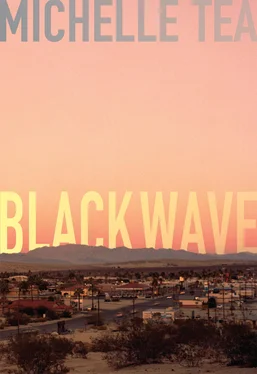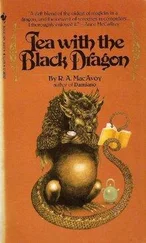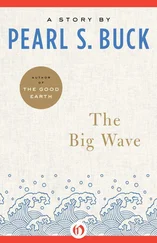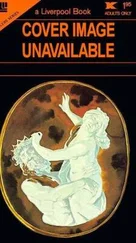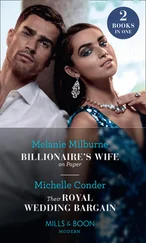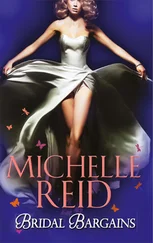Michelle had placed her futon along the back wall of the studio’s main room, flush against windows that overlooked the alley below. Cops routinely ousted homeless youth from the alley, barking at them in the night, waving their flashlights like kids at a rave. The windows looked directly into the apartment next door, occupied by a man with long gray dreadlocks who shopped at the bookstore. Joey claimed to see him picking up the rent boys who worked the ho stroll by the gay center. Joey knew all about the gay center and shared with Michelle its secrets — by day all the rich Hollywood A-gays had meetings and fundraisers inside the compound, but when the sun began to set the neighborhood seethed with rent boys and tweaker transgender women selling their ass. It was the first time Michelle felt interested in going there.
The man across the alley was roommates with a dog with a meaty head, a rottweiler. Drool came rainily from its lips. The dog would come to the window, slap his paws on the sill, and crane his head, barking at Michelle as if seeking revenge. It was scary. Scarier still was when he propped himself in the window and simply watched her. He was like a monster or a man — a serial killer, a Peeping Tom. A large, intelligent animal considering you. Michelle would close the blinds, robbing the apartment of sunlight.
Michelle knew the placement of the futon was energetically wrong. She suffered nightmares of Kym and Wendy dying, of being stabbed in her sleep by killers who crept in through the rotting bathroom window. The position of the bed was wrong but there was nowhere else to put it. She had copied the layout of the woman who lived across the hall, after glimpsing her studio as she unlocked her door. In her apartment the sun felt soft, gentle, not murderous. The place was clean. It did not seem to have the pall of gloom that hung over Michelle’s studio. Her neighbor’s bed was backed up against wide, bright windows, inviting sunlight to pour over homey patchwork quilts, over ruffled throw pillows, over her cat — a cat that sprawled in the delicious glow, its tail twitching lazily. Wow, Michelle said, shamelessly peering through the door.
The woman smiled sheepishly and shrugged. Yeah, she said. Her cat was named Freedom and every so often the thing would escape and the woman would chase it down the halls yelling, Freedom, no! No, Freedom! No, Freedom!
Everyone in the building seemed to be thriving in Los Angeles. A guy downstairs was a computer programmer who drove a VW Bug he’d painted to look like that Mondrian painting: blue and red and yellow. Upstairs was an aspiring actor with shiny hair who had helped Michelle and Quinn carry a couple of boxes upstairs the night they arrived, then generously offered them a line of cocaine. A golf punker named Tommy lived down the hall. His hair was a torture chamber of perfectly straight spikes around his head, like a porcupine. He had created the ultimate styling gel for golf punkers, the Krazy Glue of hair products. Michelle hadn’t been aware of golf punkers before moving to Los Angeles, but apparently it was a thing — there was even a store called Golf Punk. Golf punkers were rich kids who didn’t think it paradoxical to enjoy their riches and familiar traditions of, say, golf, while also jamming out to punk music and adopting the aesthetic.
Michelle’s next-door neighbor hung seasonal decorations on her front door, above a chirpy perennial sign reading Think Pink! As time wore on, Michelle watched the ornaments on the front door shift from summertime ladybug to goofy-toothed jack-o’-lantern to glittering plastic snowflake. Passing her door gave Michelle the sinking feeling of living in a college dormitory. Why did this woman feel the need to hang a sign instructing everyone to Think Pink? What did it even mean to Think Pink? Michelle came upon her once as she unlocked her accessorized door. Her Chiclet teeth stretched into a newscaster smile and her hair was a maroon color, a fake reddish purple that swung above her shoulders in a perky bob.
Boy, am I glad you moved in! She greeted Michelle as if she knew her. The last guy who lived in your place — ugh! She flicked her hand around to ward off the evil past of Michelle’s apartment.
What Do You Mean? Michelle inquired.
Oh, he was an alcoholic, she said, but a bad one. Real bad. And PCP too. They brought him out of here one night on a stretcher and there was blood everywhere. I don’t know what he did. I don’t know how they got it out of your carpet! She chortled. Her door swung open, revealing a pale-pink temple of single girlishness. We’ll have a drink sometime, she promised. I’ll tell you all about it. The door clicked shut behind her. Think Pink!
Michelle moped into her gruesome apartment. Had someone actually died here? Was that the vibe of wrongness she felt, the bad feng shui? Was the ghost of this man hunkered in the corner, drifting above the suspicious spots and stains, blotches that Michelle now knew to be blood, was he watching Michelle like the rottweiler across the alley, did he recognize her as a kindred spirit, another addict who had come to die, alone, in this miserable little piece of Hollywood?
What is this guy’s problem? Michelle wondered, staring at a character outline of man-Michelle on her computer screen. He’s got a great job and this house and stuff, and his wife is nice and his kids aren’t deformed. Why is he so angsty? Is it just the human condition to be angsty? If so, why couldn’t Michelle just be her queer feminist fuckup angsty self and be universal that way?
Don’t be reactionary, Michelle scolded herself. The human experience is male. Okay. Does he have a problem with his father, aren’t men always competing with their father or something? Michelle didn’t have a father so she didn’t know how to pursue that narrative. She cursed her lousy imagination. The real problem here was she just wasn’t a very good writer. Okay. If this guy is going to do a bunch of drugs, what is it that he’s trying to escape? The prison of masculinity? How sexism hurts men, too? Maybe he just wants to cry. Maybe he becomes a massive drug addict because the patriarchy won’t let him cry, they’ll call him a fag and throw shit in his hair. He’d get fired from his job if he cried and would be forced into a life of crime and he’d get busted because nothing in his protected, middle-class existence prepared him for that. He’d end up in prison getting gang-raped till he shanked himself in the throat with a shiv made from a burned toothbrush.
Michelle could intuit the clear narrative trajectory of a man crying to his suicide in prison. This seemed promising. Maybe Michelle could actually keep the ideas that obsessed her — injustice, struggle, gender, feminism — but put them onto a man, thereby making them universal! Women have been trying to make feminism universal forever but had anyone ever thought of this? She would be such a hero! Michelle felt all fired up but it was probably just coffee. She felt herself sag as the caffeine peaked in her bloodstream and began its retreat.
All anyone would have to do is look at her, Michelle, the author, and her ulterior motives would become clear. The book would be deemed suspect, have an intention other than literary, be branded propaganda. For such a novel to succeed a man would have to write it.
Every female Michelle knew was writing memoirs, excavating dark childhoods and heartache. Michelle didn’t know any men writing memoirs, but she also didn’t know any men — other than trans men. Maybe she could write a memoir under a pen name, a man’s name, infuse it with all the molestation and tragedy found in a common female memoir, and bam! a best seller, maybe. She could write a novel about a girl pretending to be a guy in order to write a successful book. Or a girl pretending to be a guy pretending to be a girl to stir up a sensational literary scandal. This was the terrible thing about fiction, Michelle could write about whatever she wanted. She could write about dinosaurs mating with unicorns in the lost city Atlantis and some fool would read it. In the face of so many options she spun, paralyzed, overthunk. She just wanted to write a humble novella about a girl in love with a petulant genderqueer teenager, both trying to get their lives together in Los Angeles, but even if she were to convince Lu to let her do it, even if she fashioned a different Lu who never got low blood sugar or did drugs, who hadn’t been raised in a household where everyone yelled at the mother, thereby learning that yelling at women was a great thing to do — even if Michelle worked all of this out, such a book would never cross over. She deleted the man-story she’d written.
Читать дальше
